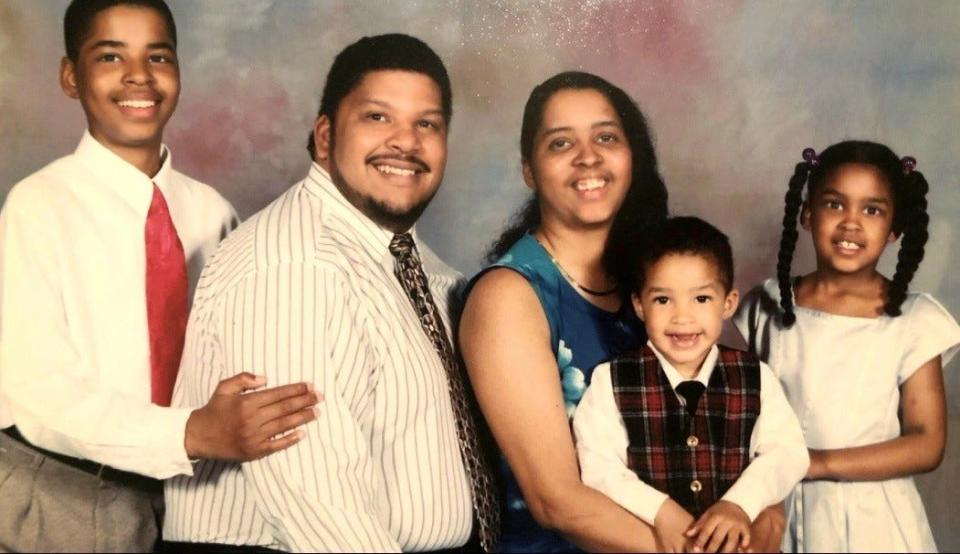America forgot about my dad's death. Don't let that happen to Floyd, Arbery and Taylor.
When I heard about Breonna Taylor’s death and then watched the videos of George Floyd and Ahmaud Arbery dying, I wondered if they felt what my father felt before he died in April from COVID-19.
He’d been turned away by three hospitals. After the last hospital wouldn’t treat him, he went home and told my mom that no one would help him. Then, the strongest man I’ve ever known broke down, crying.
"They’re gonna let me die. They’re gonna let me die,” he muttered through sobs. Similar to Arbery and Floyd, he was gone soon after.
Like their stories, my dad’s story got a lot of attention ... at first.
It seemed like every network and newspaper was calling. So, even though I was grieving, I had hope, because I thought something was going to change. But then the calls stopped. The news coverage ended. Now, America is opening back up like my dad isn’t dead, like people aren’t suffering, and like Black people, Latinos and indigenous peoples aren’t still suffering and dying at alarmingly disproportionate rates.
To be clear, this isn’t about the sensationalism or fickleness of the media. That horse is dead and rotten. It’s about the repeating of this pattern that we’re in the middle of right now. And not letting it play out yet again.
Both my parents turned away
I once wondered what it felt like for a Black person in the 1950s to have to step off the sidewalk when a white person walked by, and look down instead of looking them in the eye. It probably felt like it feels when you get pulled over and you have to keep your eyes looking a certain way, your hands in a certain position, and you can’t talk back if they insult you. You can’t defend yourself if they threaten you or hurt you. You can’t make any sudden movements, even though your knees might be shaking, because they could kill you ... and get away with it.
Or how you might feel if you’re at risk of dying from coronavirus and a young white woman who’d eaten "bad sushi" gets treated, but you don’t.
That’s what happened when a hospital turned away my mother, who had severe coronavirus symptoms, on the same day my dad died after being denied proper care.

“One thing coronavirus did was make some of our injustices tangible,” says Jill Collen Jefferson, the founder and managing partner of Julian, a civil rights and international human rights law firm based in Washington D.C. “This moment is bigger than three killings and police brutality. It’s the thousands of disproportionately Black, Latino, and indigenous deaths from COVID-19, and the inequalities they highlight and make tangible in housing, income, medical access, and quality of care, among others.
Rooting out racism: A coronavirus to-do list for the pandemic and beyond starts with opening our eyes and hearts.
"Against this backdrop, that same community is preyed upon through police brutality and other manifestations of racism. That is the picture that the last few months have painted for us. In a single snapshot of a confined period of time, you see the problems that have pervaded communities of color here for centuries.”
The last time I heard my dad's voice
It’s time for the next civil rights movement, before another family ends up like Ms. Taylor’s, Mr. Arbery’s, Mr. Floyd’s, or mine.
I will never forget April 6. With 15 minutes left before midnight, my dad called. I told him I loved him, and that I would see him tomorrow.
It was the last time I ever heard his voice.
Overcoming history: Pandemic and police killings reveal brutal status quo. We can fix this. Why won't we?
At 6:45 a.m., my phone wakes me. It's my brother, Troy, screaming that daddy won't wake up. I get dressed as fast as I can. Ten minutes later, I’m approaching my parents’ home. I see the ambulance parked out front. Police are taking pictures of the house. I run inside and up the stairs. I see the first responders around my dad. He looks asleep, but he's blue. I break down instantly and completely.
I don’t remember walking down the stairs or out the door, but I go sit in my car and just cry, because my dad is gone forever.
He didn’t have to die. Breonna, Ahmaud, George. They didn’t have to die, and the thing is, no one else has to.
Keith Gambrell of Detroit is the son of Gary Fowler, a Black man whose coronavirus death made national news in April after he was denied treatment by three hospitals. This column originally appeared in the Detroit Free Press.
You can read diverse opinions from our Board of Contributors and other writers on the Opinion front page, on Twitter @usatodayopinion and in our daily Opinion newsletter. To respond to a column, submit a comment to letters@usatoday.com.
This article originally appeared on Detroit Free Press: Three hospitals turned my dad away then America forgot about his death

